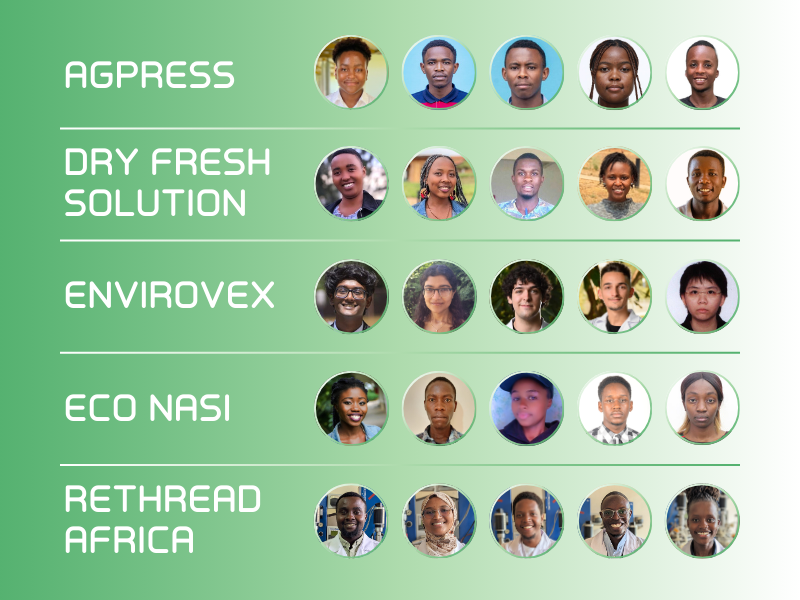Select student teams from eight countries present final designs addressing malnutrition, post-harvest waste and wastewater during the international sustainability competition’s live awards event in Michigan on May 16.
Grand Rapids, Mich. USA, April 24, 2025 — Five student teams’ pioneering solutions to the planet’s “wicked problems” are on the horizon as the select international group advances to the final stage of Wege Prize, the world-renowned competition for a sustainable, circular economy through game-changing designs with real-world applications and impact.
Chosen by a team of expert judges, this year’s five finalist teams will present their highly developed solutions to the judging panel in mid-May to public live and streaming audiences during the Wege Prize finale and awards event. Among the top team’s innovative designs are enterprising solutions to malnutrition, post-harvest loss, and wastewater, along with environmentally sound alternatives to traditionally processed leather and fabrics.
Developed by the Wege Center for Sustainable Design at Ferris State University’s Kendall College of Art and Design (KCAD) in Grand Rapids, Mich. with the support of The Wege Foundation, Wege Prize ignites real-world solutions to economic and sustainably challenges for the future. Each year, multidisciplinary student teams from across the globe refine their designs from expert judges’ input throughout the competition’s nine-month program, with the top five finalist teams competing for a total cash prize purse of $65,000.
For over a decade, the dynamic annual awards event has brought together worldwide leaders in education, the environment, design, business, and regional government to explore the new ways that young scholars globally are working to solve economic and sustainability challenges.
“Collaborations are the core of meaningful solutions to redesigning how economies work,” says Gayle DeBruyn, an award-winning KCAD professor and leader of Wege Prize. “Wege Prize’s student teams understand that working together across institutional, disciplinary, and cultural boundaries creates a promising path to achieving their fully realized, game-changing designs.”
Five Finalists, Ten Countries
Wege Prize 2025 top teams have advanced through the competition’s unprecedented pool of 90 initial teams from 31 countries, with the finalist students hailing from Costa Rica, Tanzania, Zimbabwe, Rwanda, Kenya, Hong Kong SAR, Spain and India, and educational facilities based in the United States, Costa Rica, Tanzania, Rwanda, Kenya, England, and Spain.
With disciplines in engineering, architecture, agriculture, business, communications, science, and economics, the five finalist teams’ varied perspectives and the essential input from Wege Prize’s judges during the competition’s four phases have been key to the collaborative development and refinement of their inventive solutions to vexing challenges.
Each of the five teams competing for $65,000 USD in total cash prizes will present their solution to a public audience in Grand Rapids, Michigan, 10:00 a.m. ET on Friday, May 16th at Kendall College of Art and Design (KCAD) and streaming live online at WegePrize.org. This year’s multidisciplinary teams include:
-
Agpress, using mealworms and maize to develop protein-enriched flour to address malnutrition.
-
Dry Fresh Solution, designing a solar-powered dehydrator to reduce post-harvest loss of produce.
-
Eco Nasi, converting pineapple waste into a leather alternative while empowering communities.
-
Envirovex, reducing the spread of antimicrobial resistance through bio-base wastewater treatment.
-
Rethread Africa, developing sugarcane bagasse into a synthetic fabric alternative that decomposes without industrial composting.
Conservation student Marie Merci Cyurimpundu of Dry Fresh Solution says the team wants people to start thinking about what they can do with waste and how the raw material can be used for something else. “Collaboration is not about just dividing tasks—it’s about having different perspectives on something and working together to form a strong, big idea,” she says, adding the aim is to provide solutions that are not only scientifically sound but also things farmers can really implement. “What I learned is that sustainability is not about sciences. It’s about the design—can it be implemented? Is it what the community needs?”
Phased input from Wege Prize’s pool of expert judges has helped advance the five finalist teams from informal proposals into robust and feasible solutions through focused testing, research, market analysis, and real-world prototyping. “Through all this, we have refined our solution, and now we can clearly see where we’re going forward. We have the opportunity to implement it as a real solution with societal impact,” says Envirovex team member Vishwa Maharajan.
More details on the five finalist teams follow below.
LIVE EVENT: 2025 Wege Prize Awards, Friday, May 16
The free 2025 Wege Prize Awards in-person program will be held at KCAD in Grand Rapids, Mich., with an accompanying free livestream that will be watched globally starting Friday, May 16, 10:00 a.m. ET at www.wegeprize.org.
To attend the 2025 Wege Prize Awards or to view the livestream and see the students present their original ideas and respond to final judge feedback, register online.

